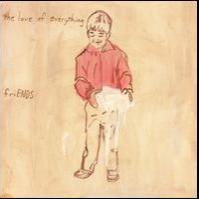Music families are fun. From the Slapstick family tree to the avant-garde folks in Montreal, it's always interesting and quirky to see where certain people end up and what kind of things they concoct with each other. One of my all-time favorite parent groups, however, has to be caP'n Jazz. Maybe it's because of the inbreeding (brothers Mike and Tim Kinsella were both prominent members) or maybe (and more likely) it is because of the talent that was in that young, seminal Midwestern group, but caP'n Jazz has one of the largest family trees around today. To try and list all the bands that have spawned from their demise would create a list longer than a Tim Kinsella song title. But, of the many bands that have come to existence the decade or so since caP'n Jazz disbanded, none have been more ignored or neglected than that of Bobby Burg's the Love of Everything.
Making his first appearance in the short-lived Beauty Pageant, Burg has contributed and continues to participate in long-running Tim Kinsella acts Joan of Arc and Make Believe, as well as, most recently, Chicago's indie math pop act Chip Up Chin Up. However, it is his not-so-solo career under the moniker of the Love of Everything that is easily Burg's longest running musical endeavor. From his first full-length, the self-released Green to 2006's Superior Mold and Die, Burg has put up a sizable catalogue of heartache-laced lo-fi folk recordings using a variety of instruments (such as a toy piano) and people (members from Joan of Arc, Owen, Pinebender, Storm and Stress, and more). And while maybe not garnering nearly as much attention as other post-caP'n Jazz acts, Burg's Friends EP, is one of the better interpretations of emo since caP'n Jazz's sole full-length, the editorially shortened Burritos.
If you take the childlike rhyming of Tim Kinsella, a more erratic, indiscreet John Samson coo, add a touch of Mike Kinsella's sorrowful melancholy, Adam Green's aesthetics, and an interest in experimentation comparable to that of the Beatles circa the White Album, then you might start to build an idea of what Burg is trying to do here. From the opening track "Friends," with its filtered-like vocals, soft but prominent looping percussion and ambient use of human conversation where you hear Burg cry out, "if you want to be my friend / you got to sleep with me," the listener quickly understands that, while nothing strikingly original is being done, it's never been done quite this humbly, simple, or authentic.
However, before one even has the opportunity to realize what just happened, Burg rushes off to the next song, one of the standout tracks on this short collection: "Strip to the Sky." At this point, Burg exposes the listener for the first time to his trademark use of the Wurlitzer electric piano, an instrument that frequents, if not establishes, most of the Friends EP. But again, before the listener notices, the next song is already in progress. At nine tracks just under 15 minutes, it's obvious Burg likes to keep it short and sweet, something he uses to his advantage.
From the Tim Kinsella-etymological "Happiness" (which feature one of Burg's signature puns, "I know I can / get caught uncontrollable happiness in an incontrollable happiness"), to the melodic repetition of the drunken swaying, American Football-esque "Cloud Broke" to the anxiety-filled, depression-ridden "Buttercups Up," Friends has some of the best and most refreshing ideas in this long-trotted genre. Burg's determination of using old instrumentation in innovative ways and new ideas in established styles helps him materialize simple pop melodies into landscapes of layered, calculated soundâ¦or maybe just minimalist prairies, but big ones at that.
After eight long years of dozens of recordings, maybe Bobby Burg and the Love of Everything will never reach the audiences his prior efforts or lineage have, but he is certainly not short on any of their creative foundations and ambitious ideas. Let's face it though; someone had to be the black sheep of the family.
